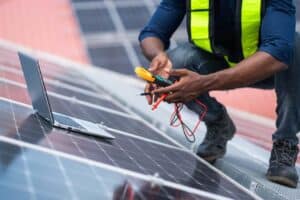Ramaphosa says having only Eskom as a generator and distributor of electricity was dangerous for the country.

President Cyril Ramaphosa on Thursday said that having only Eskom as a generator and distributor of electricity was dangerous for the country – therefore the days of the power utility’s monopoly were numbered.
In the same breath, the president embraced renewable energy and urged the country to move faster into clean energy because it was not only cheaper and more beneficial, but would boost growth and attract investors.
“We have no choice but to navigate our way through this transition. We made it clear we will move away from fossil fuels but we will undergo a transition that will leave no one behind,” Ramaphosa said.
However, despite the country transitioning from coal-fired energy to clean energy and decommissioning more old power stations, it would not do away with coal any time soon because it had recently build two major coalfired stations, Kusile and Medupi.
ALSO READ: Eskom saboteurs need to be arrested
“Coal will remain part of the energy mix beyond 2030. We made that clear to our international partners,” Ramaphosa said.
He said South Africa would not accept unfavourable conditions to accompany the R131 billion offered by the West to assist a transition from fossil to clean energy.
At the recent Cop26 conference held in Glasgow, Scotland, the US, the UK, France, Germany and the European Union offered to support South Africa’s transition to a lower-carbon economy.
The assistance would come in the form of financing loans and grants in the next three to five years. The president said the assistance might increase from the promised amount as discussions progressed.
Some people feared the conditions could amount to the notorious structural adjustment programmes of the International Monetary Fund.
But Ramaphosa said he did not see South Africa being “short-changed in any way” by the West.
Answering questions in parliament yesterday, Ramaphosa stressed government was not obliged to accept the offer or the conditions.
ALSO READ: Power cuts are here to stay, Ramaphosa tells Parliament
He mentioned that among the conditions was for South Africa to produce a clear socioeconomic plan.
The conditions would be scrutinised by government in conjunction with other role players, including trade unions, that would be engaged in the process to ensure the conditions were favourable to the country.
He said the countries in the northern hemisphere were the biggest emitters of greenhouse gases and carbon.
“They damage the climate and we are all paying for the damages they cause.
“The unfortunate part is that the climate is changing for all of us,” he said.
Support Local Journalism
Add The Citizen as a Preferred Source on Google and follow us on Google News to see more of our trusted reporting in Google News and Top Stories.








